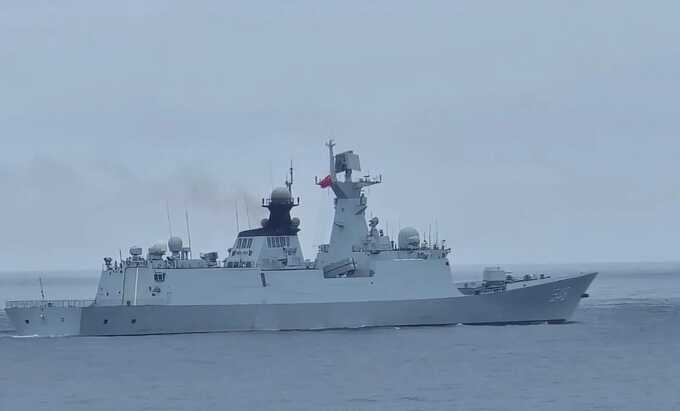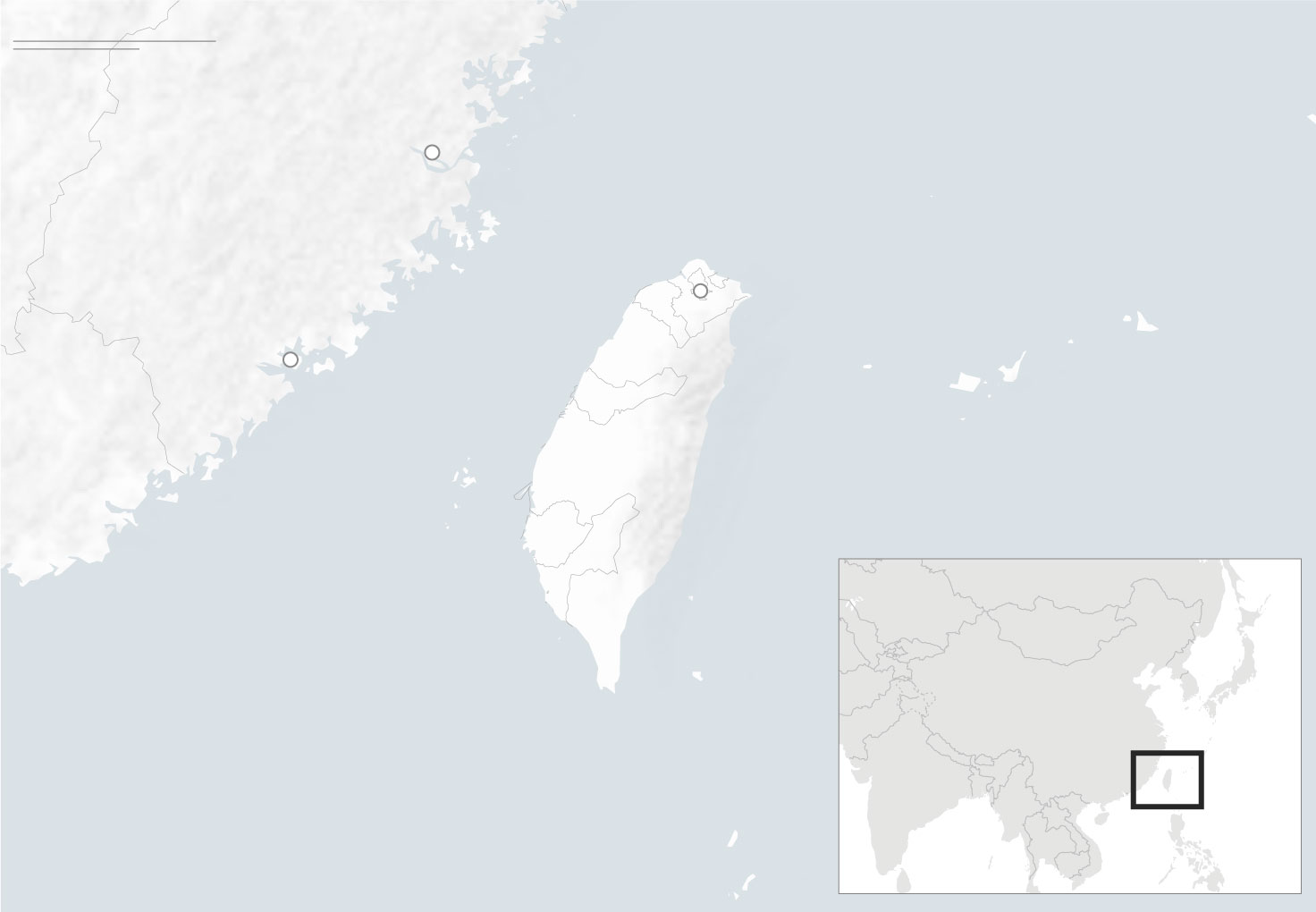How China could take Taiwan without even needing to invade

China’s military could isolate Taiwan, cripple its economy, and make the democratic island succumb to the will of Beijing’s ruling Communist Party without ever firing a shot, a prominent think tank warns.
Fears the Communist Party might make good on its promise to one day take control of Taiwan, by force if necessary, have been heightened in recent years by Chinese leader Xi Jinping’s increasingly bellicose actions towards the self-ruled island.
China’s refusal to condemn Russia’s invasion of Ukraine has only added to those fears.
In such a scenario, analysts and military strategists have long focused on two key options available to China – a full-scale invasion or a military blockade.
But a Washington think tank, the Center for Strategic and International Studies (CSIS), warns there is a third way, one that will make it far harder for the United States and other like-minded democracies to counter: Quarantine.
Using “gray zone” tactics – actions just below what might be considered acts of war – the China Coast Guard, its so-called maritime militia and various police and maritime safety agencies could initiate a full or partial quarantine of Taiwan, possibly cutting off access to its ports and stopping vital supplies like energy from reaching the island’s 23 million people, a newly released report from CSIS says.
The naval, air and ground components of the People’s Liberation Army (PLA), the world’s largest military force, might play only auxiliary and support roles, authors Bonny Lin, Brian Hart, Matthew Funaiole, Samantha Lu and Truly Tinsley write.
“China has significantly increased pressure on Taiwan in recent years, stoking fears that tensions could erupt into outright conflict. Much attention has been paid to the threat of an invasion, but Beijing has options besides invading to coerce, punish, or annex Taiwan,” the report says.

At the Shangri-La Dialogue defense summit in Singapore earlier this month, Chinese Defense Minister Adm. Dong Jun warned those who support any moves for Taiwan independence will “end up in self-destruction.”
“We will take resolute actions to curb Taiwan independence and make sure such a plot never succeeds,” said Dong, speaking through a translator, while slamming “external interfering forces” for selling arms and having “illegal official contacts” with Taiwan.
China’s escalating gray zone tactics were on stark display this week as China Coast Guard vessels clashed with Philippine Navy boats in the South China Sea.
Videos showed Beijing’s troops threatening Filipinos with an axe and other bladed weapons, and Manila said one of its soldiers lost a thumb in a Chinese-instigated collision.
The level of violence was a major step up from previous clashes near Second Thomas Shoal, where the Philippines maintains an outpost on a beached warship in waters claimed by both Beijing and Manila.
Similarly, Beijing’s military and economic intimidation of Taiwan, a highly developed free-market economy, has grown much more pronounced under Xi.
China’s ruling Communist Party claims the island as its own, despite never having controlled it, and has vowed to “reunify” with it, by force if necessary.
But the CSIS report says Beijing has strong options that could not only keep the PLA out of the fight but could actually put the island democracy or its supporters like the United States in the role of initiators of military conflict to preserve Taiwan’s autonomy.
The report notes that the China Coast Guard – like most coast guards around the world – is considered a law-enforcement agency. This means it can stop and regulate shipping around the island in what is termed a quarantine, which differs from a blockade.
“A quarantine (is) a law enforcement–led operation to control maritime or air traffic within a specific area while a blockade is foremost military in nature,” the report says.
International law considers a blockade an act of war, experts say.
“A quarantine led by China’s coast guard is not a declaration of war against Taiwan,” the report says, and would put the US in a difficult position, its authors warn.
Washington is legally required – under the Taiwan Relations Act – to provide the island with the means to defend itself, and it supplies it with defensive weaponry.
US President Joe Biden has gone further than the legal requirement, saying repeatedly he would use American troops to protect Taiwan, a warning that appeared to deviate from Washington’s previous stance of “strategic ambiguity” and one that the White House officials have walked back.
But if US military ships or aircraft intervened in what China says is a law enforcement operation, the US could be seen as initiating military hostilities.
The report puts the China Coast Guard numbers at 150 ocean-going vessels and 400 smaller ones, like the PLA Navy, the world’s largest force in terms of fleet size. Beijing has hundreds of more vessels in its Maritime Safety Agency and maritime militia, fishing boats integrated into China’s military and law enforcement services.
Taiwan’s coast guard, with only 10 ocean-going ships and about 160 smaller ones, lacks the numbers to push back a quarantine effort, the report says.
The CSIS authors note that quarantine actions taken by Beijing could be extremely limited and still have the effect of strangling Taiwan economically. Few operators would want to face the possibility of having their assets seized by Chinese authorities and might voluntarily stop servicing the island.
“Demonstrated Chinese willingness to search and seize only a handful of commercial ships could have an outsized deterrent impact and discourage similar transgressions,” the report states.
Limited search and/or seizure actions have an effect on flights to Taiwan as a quarantine can easily be extended to the air, the report states.
Only a handful of flights would need to be warned off by Chinese aircraft to have a stifling effect on all traffic, according to the report.
China regularly flies military aircraft around the island, sometimes dozens in a day. In the 24 hours ending at 6 a.m. Friday, 36 Chinese military aircraft crossed into Taiwan’s air defense identification zone, Taiwan’s Defense Ministry says.
Meanwhile, a quarantine, rather than a blockade, would not require China to close or restrict access to the Taiwan Strait, the CSIS report notes. That means Washington and its allies could lose one of their biggest claims to intervene under international law, preserving freedom of navigation in an international waterway.
“If the quarantine is cast as a law enforcement operation, China can easily announce the end of the operation and claim its objectives were met,” the report says.

To keep things even more low-key, China might not even need to use the word “quarantine” to begin an operation to isolate Taiwan, the authors say.
Under its claims that Taiwan is Chinese territory, Beijing could require customs declarations to be filed before vessels can call in Taiwan. For those that fail to comply, enforcement mechanisms could have a chilling effect on all shipping.
“Chinese law enforcement vessels will be authorized to board vessels, conduct on-site inspections, question personnel, and undertake other measures against noncompliant ships,” the report said.
This idea allows a limited scope of operations for China. For instance, it could just target the island’s busiest port, Kaohsiung, responsible for 57% of Taiwan’s maritime imports and most of its energy imports, according to the study.
Plausible, but still fraught with risk for China
Outside analysts who reviewed the CSIS report and spoke to CNN found it plausible. But they also harbored important doubts about how things might play out.
Some mentioned how the economics don’t necessarily play in Beijing’s favor.
“Maintaining the quarantine will be expensive and time consuming,” said Carl Schuster, a former director of operations at the US Pacific Command’s Joint Intelligence Center.
“Taipei won’t give up in under 60 days,” Schuster contends. “Can Beijing sustain the effort and possible international reaction for that long?”
Efforts to upset the status quo across the Taiwan Strait could further erode Beijing’s foreign trade, the experts warn.
Alessio Patalano, professor of war and strategy at King’s College in London, notes the challenges the Chinese Communist Party is already facing with an economy still struggling to recover from Covid-19 isolation that has seen growth rates plummet and new trade restrictions, like tariffs on its electric vehicle exports.
Taiwan is a prominent industrialized economy, a crucial node in global supply chains and a manufacturer of the vast majority of the world’s most advanced semiconductors. A quarantine on the island would have economic repercussions not just domestically, but globally.
While most nations diplomatically recognize Beijing over Taiwan, the island has forged increasingly strong unofficial relations with major western democracies, deepening those ties in recent years as Beijing’s threats have hardened.
Taiwan and China are also deeply economically intertwined. Last year, 35% of the island’s exports went to the Chinese mainland, most of which were integrated circuits, solar cells and electronic components, according to Taiwan’s Ministry of Economic Affairs.
Imports from the mainland accounted for 20% of the island’s total imports in the same year. Between 1991 and 2022, Taiwanese companies invested a total of $203 billion in the mainland, according to Taiwan government statistics, creating millions of jobs in China.
Additionally, quarantines can push populations to rally with the government, rather than rise up against it, says Sidharth Kaushal, senior research fellow at the Royal United Services Institute in London.
“Historical evidence shows that even severe blockades have limited coercive value, and a limited quarantine might result in a rally around the flag effect,” he says.
A quarantine could also push Taiwan’s government to declare independence, something Beijing has repeatedly said would likely bring armed conflict, Kaushal warns.
“This would then leave the (Communist Party) with the options of either escalation or a major setback,” he says.
Patalano says for China, patience is the key to realizing its goal of “reunification.”
Escalation, and certainly invasion, is not “cost-efficient,” he says. War costs not only lives but national wealth.
Read more similar news:
Comments:
comments powered by Disqus

































